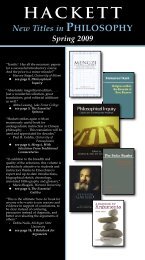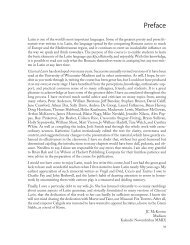Study and Discussion Questions for Early Buddhist Discourses
Study and Discussion Questions for Early Buddhist Discourses
Study and Discussion Questions for Early Buddhist Discourses
- No tags were found...
Create successful ePaper yourself
Turn your PDF publications into a flip-book with our unique Google optimized e-Paper software.
tradition? With relatively mundane goals like “aversion” <strong>and</strong> “dispassion,” is Buddhismopen to the charge of pessimism?7) The Buddha was at first reluctant to teach to others the dhamma he discovered. Why? Werehis reasons good ones? Why did he change his mind? Does one have an obligation toshare such a discovery?8) In a curious (perhaps even embarrassing) encounter, the very first person the Buddha meetsafter his enlightenment, the naked ascetic Upaka, spurns the Buddha’s teaching. Whywas such an encounter—which must be considered somewhat embarrassing to the<strong>Buddhist</strong>s—included in the discourse?9) Many religious traditions suggest that leaving the household or domestic life <strong>for</strong> an ascetic ormonastic life is an important (if not necessary) step toward religious goals. The Buddhadescribes this as “going from home to homelessness.” Is leaving the domestic life criticalto making religious progress? If so, why?10) Are sensual pleasures really as dangerous as the Buddha seems to say they are? While allouthedonism may be an unjustifiable extreme, sensual pleasures seem to be an importantpart of human happiness. So how can the Buddha justify his emphasis on restraining thesenses <strong>and</strong> developing an “aloofness from sense pleasures?” What, then, of the arts(which often celebrate the pleasures of sense experience)?11) The higher states of experience recommended by the Buddha <strong>and</strong> several other traditions ofhis time (e.g., the four jhānas <strong>and</strong> the various planes) are the product of long <strong>and</strong> arduousstriving <strong>and</strong> so not immediately available to most people. Is there any reason, other thanthe authority of sages like the Buddha, to consider such accounts of higher states ofexperience plausible?12) The Buddha often personified evil by referring to Māra, the Evil One (a <strong>Buddhist</strong> “Satan”).Should Māra be considered in literal terms as a real being? Or is Māra better interpretedas a fictional being or a metaphor?









